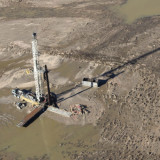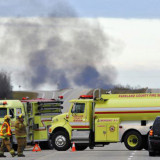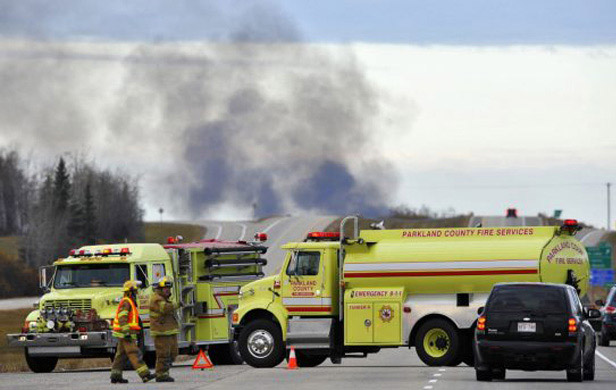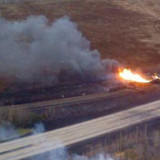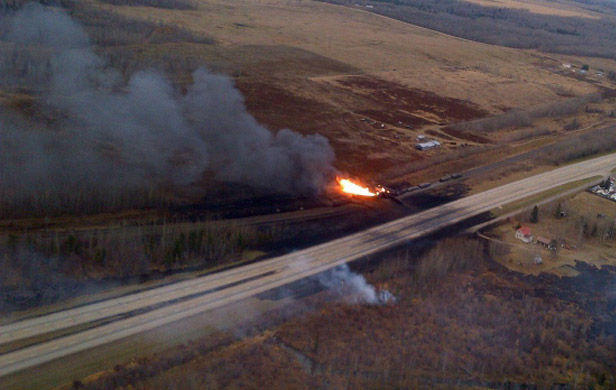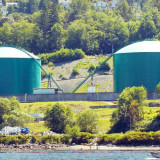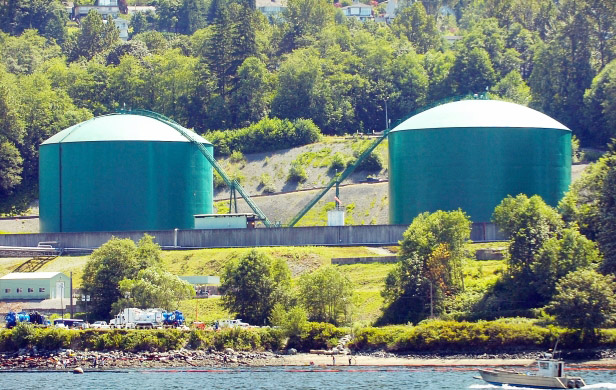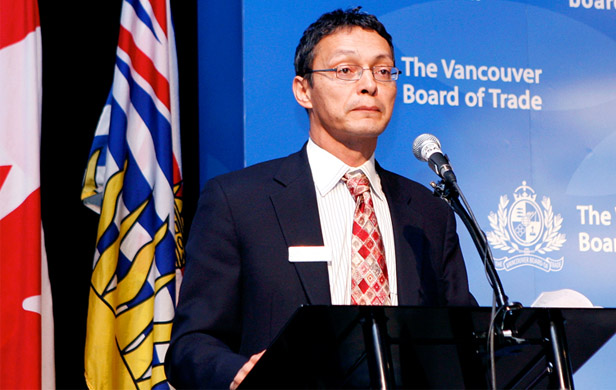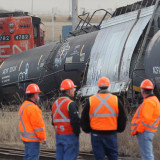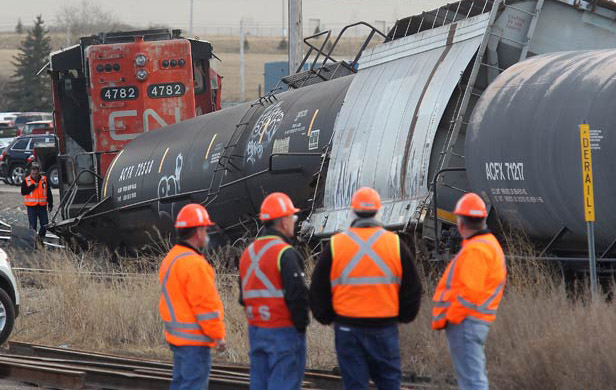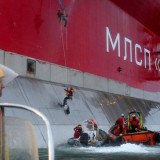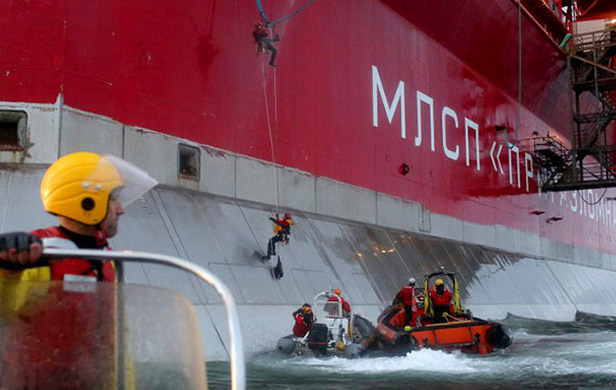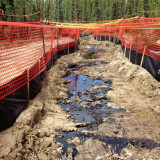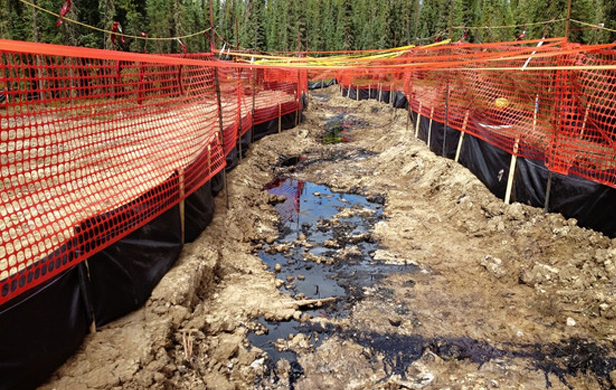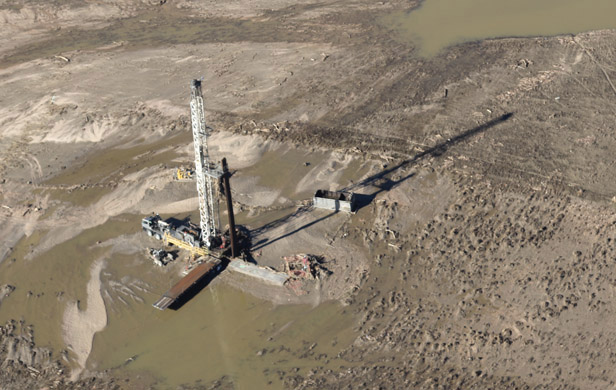
by David Lavallee
I first heard about the flood that left the Colorado fracking industry underwater by way of a story on The Common Sense Canadian. I happened to be in neighboring Utah on a shoot for my new documentary, entitled To the Ends of the Earth. This documentary focuses on the economic consequences of our “ends of the earth” exploration for oil.
News of the flood did not draw my attention initially – after all, epic floods are commonplace nowadays. In the past year we have witnessed a series of events which, in isolation, don’t seem to add up to much – but taken together tell a powerful story of the shifting carbon balance of our planet, our home.
[quote]Not since the wholesale slaughter of cetaceans 150 years ago has energy been this violent. [/quote]
Cyclone Phailin, a storm the size of France, recently pounded the eastern coast of India. The storm surge for Hurricane Sandy (widest storm in US history) left the global financial capital, Manhattan, underwater. Floodwaters left the town of Canmore and the city of Calgary, Canada’s energy capital , underwater. Meanwhile, an observatory in Mauna Loa Hawaii measured a long-feared milestone – 400 PPM carbon dioxide in the atmosphere – a record last beaten 5 million years ago.
So the simple fact of a flood in Colorado didn’t immediately grab my attention (despite being a “one in 10, 000 year event”). What grabbed my attention was the richness of the metaphor – one of the industries (among many) causing this calamity was actually underwater. Add to that Manhattan and Calgary – where myriad decisions are made, decisions changing the carbon balance of our planet – underwater!
Weld County, Colorado fracking capital
Weld County, Colorado is the site of some of the most intense fracking in the world (a powerful short film on Colorado fracking can be found here.
There are 50, 000 wells in Weld County alone. During the flood, emergency procedures were enacted and the wells were shut in, averting a catastrophic spill of the many hundreds of proprietary toxic waste chemicals that typically get injected a mile below the ground into ancient coral reefs that have lain dormant for many millennia – until violent underground explosions crack open these formations releasing the shale gas.
Concerns over frack fluid leaks overblown
Not since the wholesale slaughter of cetaceans 150 years ago (back then oil came from Spermaceti, not BP) has energy been this violent. Only 75,000 gallons of crude oil/condensate were reported spilled in the flood, an amount that paled in comparaison with toxic waste from the flood that washed over feedlots – agricultural waste, because of it’s volume, is arguably a far greater contaminant than a small amount of condensate.
Yet the social media circles were abuzz with outrage over the spills, and rumours of the coming human health crisis from leaked frack fluid – tempest in a teacup.
I watched this debate unfold and wondered what parallels there were with my own province’s current battle against Enbridge (with its focus on spills) and the fracking of northern B.C. Could it be that the environmental movement is missing the point?
Fracking your front yard
Allow me an alternate view of what the point could be. Consider the daily operations of a frack well. In Weld County, drilling operations are occurring in the one place that big oil has been forced to go now that there is no place else left to drill: your front yard. The proximity of wells to people’s homes, playgrounds, schools in this area is quite simply shocking.
Nosebleeds and ethyl benzenes
Near Longmont, CO. I met and interviewed Rod Brueski, a local organic farmer. He showed me his family’s “blood panel” document, a medical procedure that they underwent as part of a study to determine the effects of living near a frack well (100 metres from his house). “My son has uncontrolled nosebleeds that last three hours,” he told me as he pointed out the variety of hexanes, ethyl benzenes and xylenes that are now in their blood.
Forget the 75,000 gallons that leaked, this industry was a disaster even before the flood hit.
A flood certainly provides an opportunity for environmentalists to point out to an industry its antisocial shortcomings, but let’s not lose sight of the bigger picture.
Governor Hincklehooper sues constituents over fracking ban
Brueski took advantage of an opportunity to point out to the governor of the state his antisocial tendencies. Governor Hincklehooper is thought of in the activist/environmental circles as being a Halliburton puppet, who advocates vociferously for the oil and gas industry at the expense of the general public. As evidence to that effect, Brueski told me he is actually using state taxpayer’s money to sue the community of Longmont for wanting to pass a municipal bill that bans fracking within city limits (a reasonable bill, one would think).
Our cameras rolled as Brueski gave the governor, who was on a flood impacts tour, a piece of his mind. It is destined to be a powerful scene in my upcoming film, one that won’t likely end up on the cutting room floor.
The root of the problem
As easy as it is to vilify the governor though, that also isn’t the point. It’s not the man in power, it’s the culture of people that placed him there. It’s the anachronistic, so-called democratic institutions that allow a person like Canadian Prime Minister Stephen Harper, with so little of the popular vote, to gain and hold power for so long.
It’s a culture of instant gratification, which has turned 40% of our economy into a casino (aka the financial services sector). It’s what turned our economy into a Ponzi scheme – a house of smoke and mirrors that almost collapsed completely in 2008, and will certainly collapse globally someday soon (Communism, which once held sway over half the globe, collapsed – is it that big a stretch to believe that capitalism could too?).
The bigger picture, bigger than oil spills from Enbridge into the Skeena river, bigger than poor leaders who lack a true democratic mandate, bigger than the volume of frack fluids spilled into the South Platte river of Weld County is the culture that perpetuates these things.
The Growth Imperative
If I had to boil it down into a few words, they would be these: the growth imperative. We have created a society in which the fortunes of politicians rise and fall based on the growth numbers they post. A society and culture so out of step with the biosphere that sustains us that we have come to view infinite growth as normal , like it’s always been this way (only since the 1950’s has it been around, really).
Infinite growth is impossible in nature, and that’s a really good thing. To paraphrase Richard Heinberg, author of The End of Growth (whom I interviewed for my film), imagine a 2 pound hummingbird – there’s a reason nature didn’t create such a creature.
The easy stuff is gone
Globalization and our economy today is a ten pound hummingbird, struggling to fly after it has gorged on free-flowing nectar. We are now fat, and the nectar of our civilization, oil and gas, doesn’t flow so freely anymore. It is fracked a mile down and a mile horizontally in Colorado, mined or steamed at enormous cost in the Tarsands – the only free-flowing stuff left is in the Arctic, and we need to dodge icebergs to get it. Just ask Shell how easy it is to access after their prize drill ship, the Kulluk, ended up on the rocks of Kodiak Island last New Year’s eve.
The rise of Extreme Energy
Quick – look around the room you are in and name one object in it that doesn’t have oil’s footprint in it, either in its manufacture or in the transportation of it to your door. This era is all about the rise of extreme energy – can we have avocados from Argentina or apples from New Zealand, brought to us on ships using oil shale (energy return = neutral – it takes a barrel of oil to make a barrel of oil shale!) or fuel our vehicles ten years from when the energy surplus from the tarsands has diminished to a 1:1 ratio because they moved into the final marginal deposits, nothing else being left.
“Economies don’t run on money, they run on energy,” Andrew Nikiforuk told me in a recent interview.
[quote]Money is just a metaphor for energy surplus.
[/quote]
Real solutions
Do I want the fracking industry to clean up their mess in Colorado, and do I want Enbridge to use state-of-the-art spill response systems if they manage to get their stinking bitumen pipe through my province? Absolutely. But I am asking far more than that – of myself and my society. I’m asking that we shift our culture of consumption that is the root cause of all these issues.
I’m asking that we recognize and rebuild a society in which the growth imperative is an anachronism, a barbaric incarnation of yesteryear, not the going concern it is today. I’m asking politicians to help create a structure that helps us plan for a non-growing economy, that helps us localize our food sources and transition off of fossil fuels that are becoming too expensive for our economy to afford anyways. I’m asking those same politicians to restructure political institutions in such a way as to be adaptive of current realities (such as climate change) and to help build a resilient society.
I suspect when we go to a protest against an Enbridge pipeline, it’s more than just the pipe we are protesting. It’s what’s in it, and what that means for us all, either economically or environmentally.
Let’s not lose sight of that, because if we do, we fall into the failed paradigm of economy vs. environment – a paradigm that puts us in a position of winning a few battles here and there but losing the war. Let’s create a new paradigm – a life-after-growth paradigm that focuses on human wellbeing.
If this is too much to ask, then let’s start with this – Halliburton and Hincklehooper: clean up your mess! We’re gonna think real hard on how you can make it up to us.
David Lavallee is the Director and Producer of the award-winning film, White Water, Black Gold. He hopes to complete his new film, To the Ends of the Earth, within a year.
